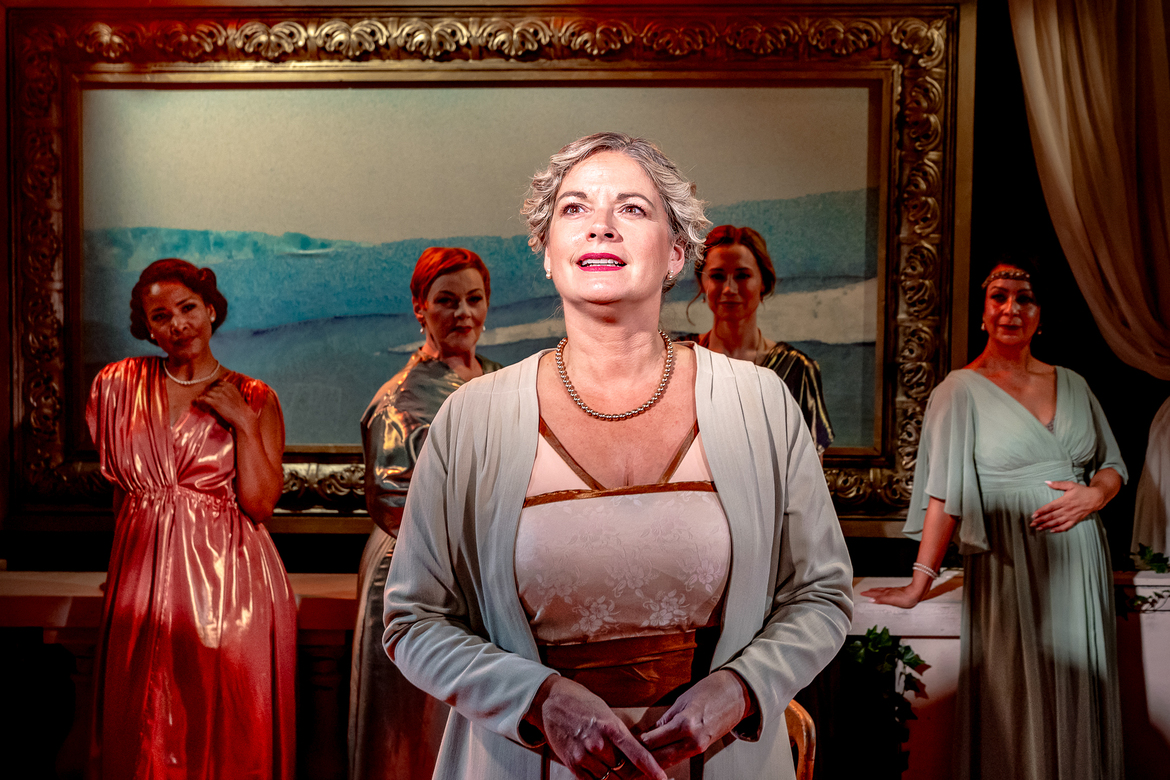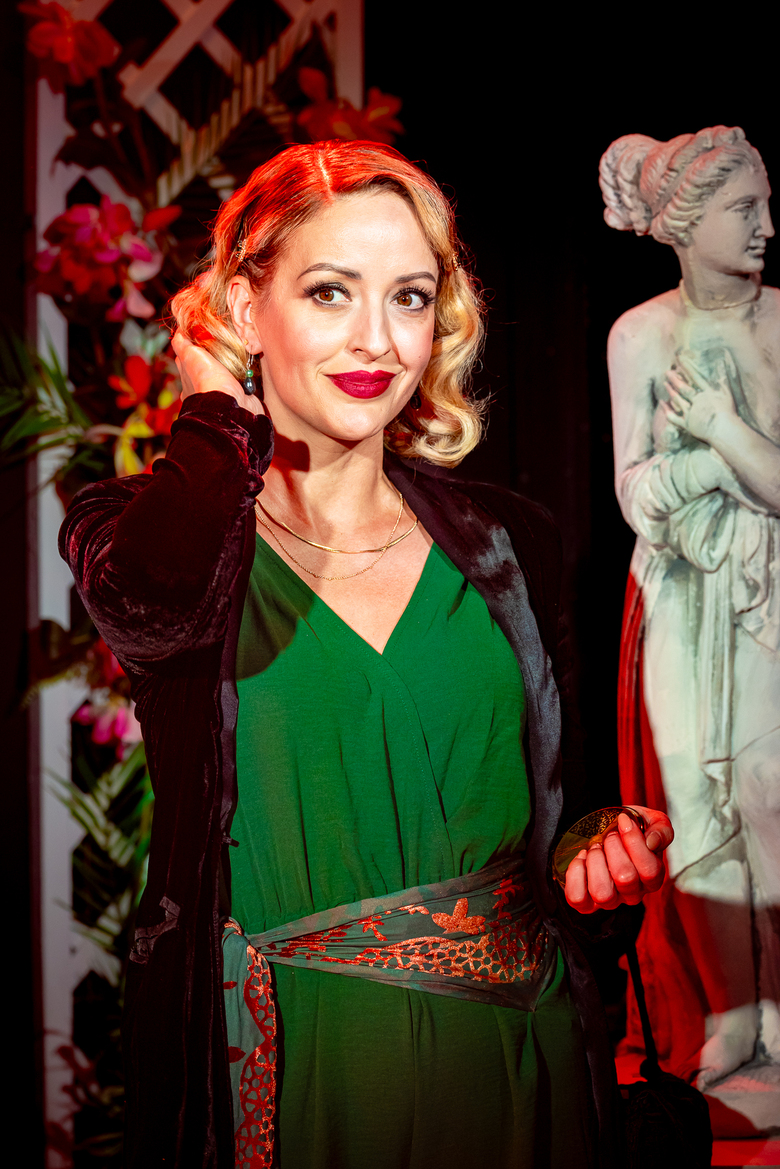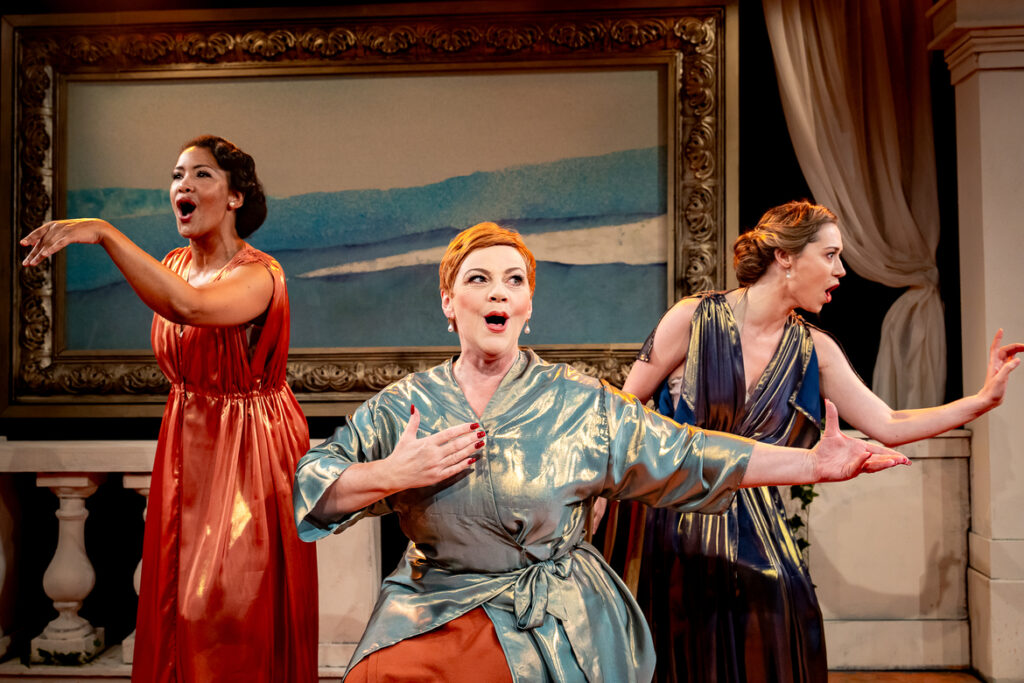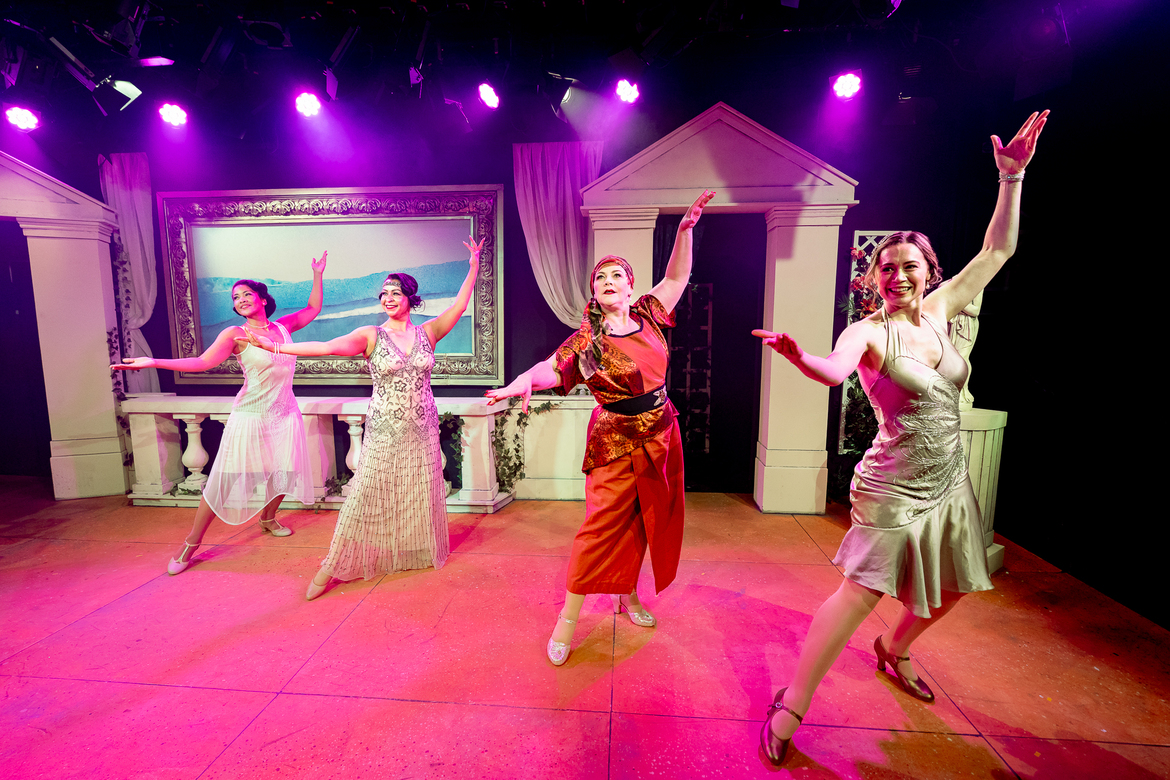Review by Simon Jenner, July 25 2025
“1919. On the windswept isle of Sirene, a group of Extraordinary Women dare to imagine a world without men.” You might not think of Compton Mackenzie first for a delicious lesbian party: the novelist of Sinister Street and Whisky Galore. But Mackenzie who indeed did broach queer themes throughout his career, wrote two queer novels inspired by his time on Capri resting after developing a Mediterranean spy-ring: Vestal Fire in 1927, and Extraordinary Women in 1928. Indeed Mackenzie’s wife had an affair with the original of one of the women portrayed. With music by Tony Award-winner Sarah Travis, and Richard Stirling’s book and lyrics Extraordinary Women, premieres at Jermyn Street Theatre till August 10th directed by Paul Foster.

Caroline Sheen in Extraordinary Women. Ensemble L to R: Jasmine Kerr, Sophie Louise Dann, Momique Young and Amira Matthews. Jermyn Street Theatre. Photo Credit Steve Gregson
Though Mackenzie’s novel is credited with one-liners and perceptions worthy of Wilde, Beerbohm and Waugh, it’s buried under detailed baroque prose; and too long for its material. There’s a whole chapter on peacock-keeping (here reduced to unnerving bird-shrieks that go nowhere)! That changed in 2021: With Travis’ swirling lyrics to carry the undertow, Stirling’s rescued the pith of it here.
Though 1928 was a bumper year for lesbian fiction (Orlando, The Well of Loneliness and Elizabeth Bowen’s The Hotel), Mackenzie’s set the story in 1919. A group of women have (like Boccaccian plague-evaders) fled to Sirene to escape the flu pandemic. With Travis’ delicious numbers full of languor and lightness, the idyll’s audible as much as visual. The talents of seven cast and two musicians are quite outrageous, their CVs fresh out of the West End’s best shows: singing, dancing (choreographed by Jo Goodwin) even comically vampish accents switched in a moment. You expect someone to announce “Efrica” but it’s “Sirene”; and that’s quite enough.
Five of the cast delight in multi-roling, and everyone sings. We’re first treated to four of them as three-mythic-creatures-plus-Sappho: and in Carla Joy Evans’ shimmering goddess-style costumes they shed to reveal period apparel (again, a ravishing contrast). Alex Marker’s set marks exits with Attic portals linked by a classic stone balustrade, above which a large quasi-Seurat takes up the whole back wall, finished in terracotta and white; bathed in attic light by Alex Musgrave. This quartet darts in and out of the action, fourth-walling and pre-empting conclusions, arguing about how to end the idyll.
It’s led though by Aurora (Caroline Sheen) and Rosalba (Amy Ellen Richardson) as lover and siren. Aurora or ’Rory’ to her friends tries to secure her relationship with beautiful, mercurial, serially unfaithful Rosalba of partly Swiss aristocratic heritage, waiting on a rich aunt. Sheen radiates a cantus firmus, a sense of love and place in her glowing soprano line. It’s tricky to be the more loving one, but sheen exudes dignity, a kind heart, and sad self-awareness. Someone calls Rosalba a lizard; she’s certainly a Keatsian Lamia, with gordian shapes of dazzling hue: Richardson suggests it, Marlene Dietrich voice and locks to boot. In ‘Extraordinary Women’ – the eponymous lead song – the feeling of “too clever by three quarters/too beautiful by half” might be shared vocally, but Rosalba thinks it all hers. Richardson, as you’d expect, gets all the stratospheric coloratura you could wish for.

Maybe it’s not a good idea to invite everyone else: too much mischief, Rosalba’s not the only siren. She’s just had an affair with young Lulu (a sparkling Jasmine Kerr), who’s also pursued by Latin lover incarnate, Carmine. That’s one of Jack Butterworth’s recurring, utterly distinct roles. Here’s he’s as devilish seducer and worse, swearing love as he sashays between Lulu and one Zoe. Lulu meanwhile sways between men and women but despite slipping from her chaperone Miss Chimbley (Sophie Louise Dann’s slightest guise) to enjoy both, Kerr brings out both Lulu’s personal warmth and helpless teen passions. A young woman who might ultimately leave the sorority: though her taste in either sex is catastrophic.
Composer Olimpia (elsewhere an irritated Sappho, Amira Matthews), is soon snared by Rosalba, who annoys everyone by fixating on Olimpe. But Olimpe’s musically keen on securing mezzo-soprano Cleo’s talents (Dann’s main role). Dann has to sound both plausibly good and tastelessly ‘off’ the whole time she sings: a hilarious feat. She’s no Florence Foster Jenkins, but brilliantly mangles the line and Olimpe is enraged.
Butterworth also flits in and out as Mackenzie, a head-bandaged war veteran and stoically coping servant. Whilst bandaged he secures Lulu’s sentimental interest. He’s also a police ‘marshal’ and most winningly of all from halfway through, Daffodil. Not just Aurora’s gay best friend, he’s her only one, bar perhaps Olga (more of her anon). Typical of the show’s zippy exchanges comes as Rory asks Daffodil: “You know, I can’t remember why we all called you Daffodil. What’s your real name?” Daffodil tells her. “Ah. That’s why.”
Jasmine Kerr, Sophie-Louise Dann and Monique Young in Extraordinary Women, Jermyn Street Theatre. Photo Credit Steve Gregson

At one point Monique Young declares “I feel like two people” and gets one of the best laughs of the evening. Not only is she Partenope the muse who declares this (whilst the others discuss what do with her two women); she’s moody but sincere Olga the Swiss/Russian muse of Clio. Olga’s pursued (of course) by Rosalba. Young’s also pearl-digging heiress Zoe, seducer of men (but has she met in Carmine an even more ruthless match?) and women. And pearls. Young’s latter avatar manifests in a showstopping Ragtime song with blistering mezzo-soprano vocals. Though each singer brings their own torch song, or duet. There’s a magical moment too, when Stirling recruits an Ernest Dowson poem as a lyric: ‘They are not long, the weeping and the laughter…’
How this all works out over two-and-a-quarter hours, even how a piano’s rolled downhill and back again, is something the two musicians evoke too with punch and discretion. Music director/arranger Sam Sommerfield on keyboard, and James William-Pattison on double bass and guitar are discreetly-positioned yet pervasive. For a bijou summer in a bottle, this can’t be beaten. Exquisite, painfully funny, and hinting at the depths Mackenzie found to his own chagrin. A gem.
Production Assistant Gareth Macleod, Stage Manager Martin Bristow
Commissioned in its original form by Stewart Nicholls, BA Musical Theatre Programme Leader – Guildford School of Acting.


